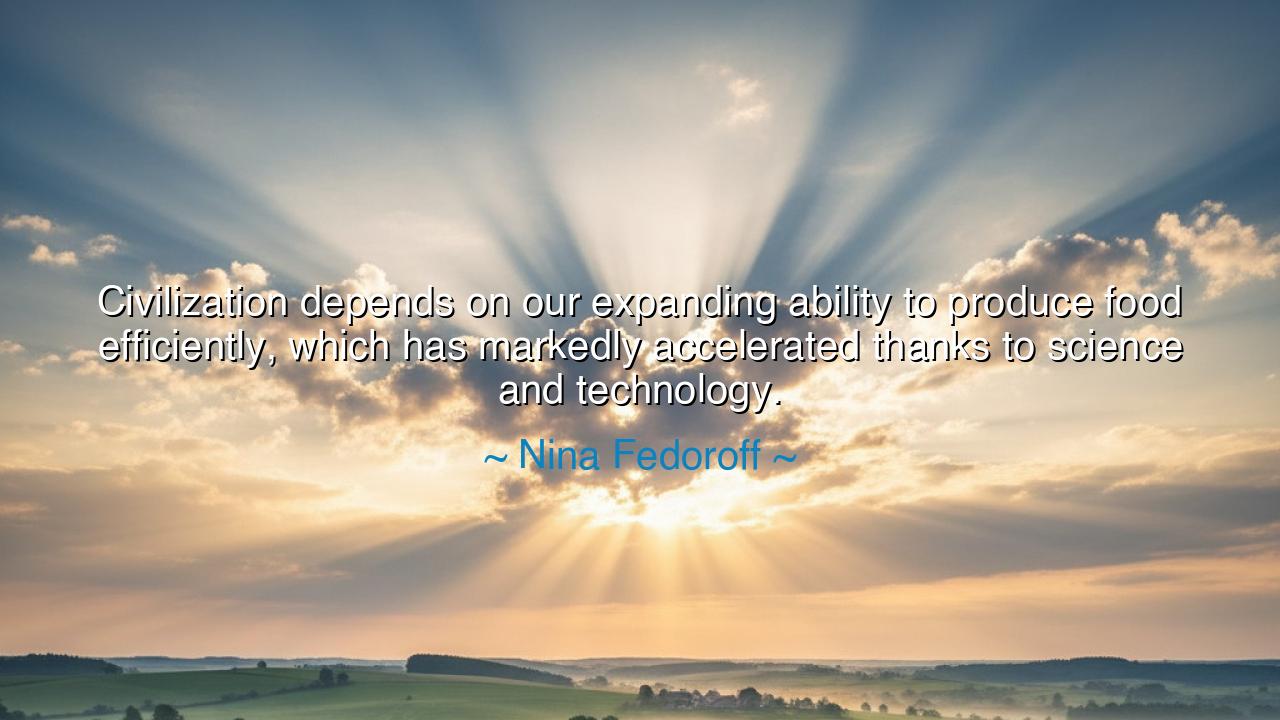
Civilization depends on our expanding ability to produce food
Civilization depends on our expanding ability to produce food efficiently, which has markedly accelerated thanks to science and technology.






Hear the words of Nina Fedoroff, spoken with clarity and timeless weight: “Civilization depends on our expanding ability to produce food efficiently, which has markedly accelerated thanks to science and technology.” This is no passing observation, but a truth as old as the first seed sown in the earth. For beneath every temple, every library, every city of man, there lies the foundation of bread. Without food, there is no leisure to dream, no strength to build, no peace to govern. The story of humanity is written not only in ink and stone, but in grain and harvest.
When Fedoroff speaks of civilization, she calls to mind the great chain of human achievement—our laws, our arts, our philosophies, our towers that rise into the sky. Yet she reminds us that all these glories rest upon the humble labor of feeding the people. The peasant’s plow, the shepherd’s flock, the farmer’s field—these are the unseen pillars that hold up kingdoms and empires. And when food falters, even the mightiest civilization crumbles, as surely as a temple collapses when its foundation cracks.
History bears witness to this eternal truth. Recall the story of ancient Mesopotamia, cradle of writing and law. Its splendor arose not by accident, but because the rivers Tigris and Euphrates nourished fields of wheat and barley, allowing its people to turn from mere survival to invention and governance. Or look to the collapse of the Maya, whose brilliant cities were abandoned when droughts withered the maize upon which their people depended. Here is the lesson: progress withers when the stomach is empty.
Fedoroff speaks also of science and technology, for it is they that have lifted agriculture from toil to abundance. The plow, the irrigation canal, the domestication of crops—each was once a miracle. In more recent ages, the Green Revolution, led by men like Norman Borlaug, harnessed genetics and chemistry to multiply yields and stave off famine for millions. What once required the labor of countless hands can now be done with machines, fertilizers, and knowledge—turning deserts into gardens and averting hunger on a global scale.
Yet let us not see this as triumph without peril. For as technology gives, so too can it take away. Misused, it poisons the soil, empties the waters, and erodes the earth. Science can magnify abundance, but it can also magnify error. Thus the wisdom of Fedoroff is not merely to celebrate progress, but to remind us of responsibility: to wield our tools with care, to honor the earth even as we master it, to ensure that abundance serves life and not destruction.
The teaching here is clear: if you would preserve civilization, first preserve its food. Guard the soil as treasure, cherish the farmer as a craftsman of life, and honor the sciences that turn scarcity into plenty. Just as a family must first gather bread before it can gather stories, so must a nation ensure its harvest before it can secure its future. The progress of technology must always serve this end: to feed, to sustain, to uplift.
Practically, this means supporting innovation in agriculture, embracing sustainable methods, and ensuring that food is not only produced in abundance, but distributed with justice. It means valuing the balance between efficiency and stewardship, between feeding the present and preserving the future. For each loaf of bread is not only sustenance, but civilization itself in tangible form.
Thus the words of Nina Fedoroff echo as ancient wisdom clothed in modern speech: that the greatness of mankind is inseparably tied to the harvest of the earth, and that science and technology are the plowshares of our age. Let us wield them wisely, that our civilization may endure, nourished not only by food for the body, but by the wisdom that feeds the soul.






AAdministratorAdministrator
Welcome, honored guests. Please leave a comment, we will respond soon